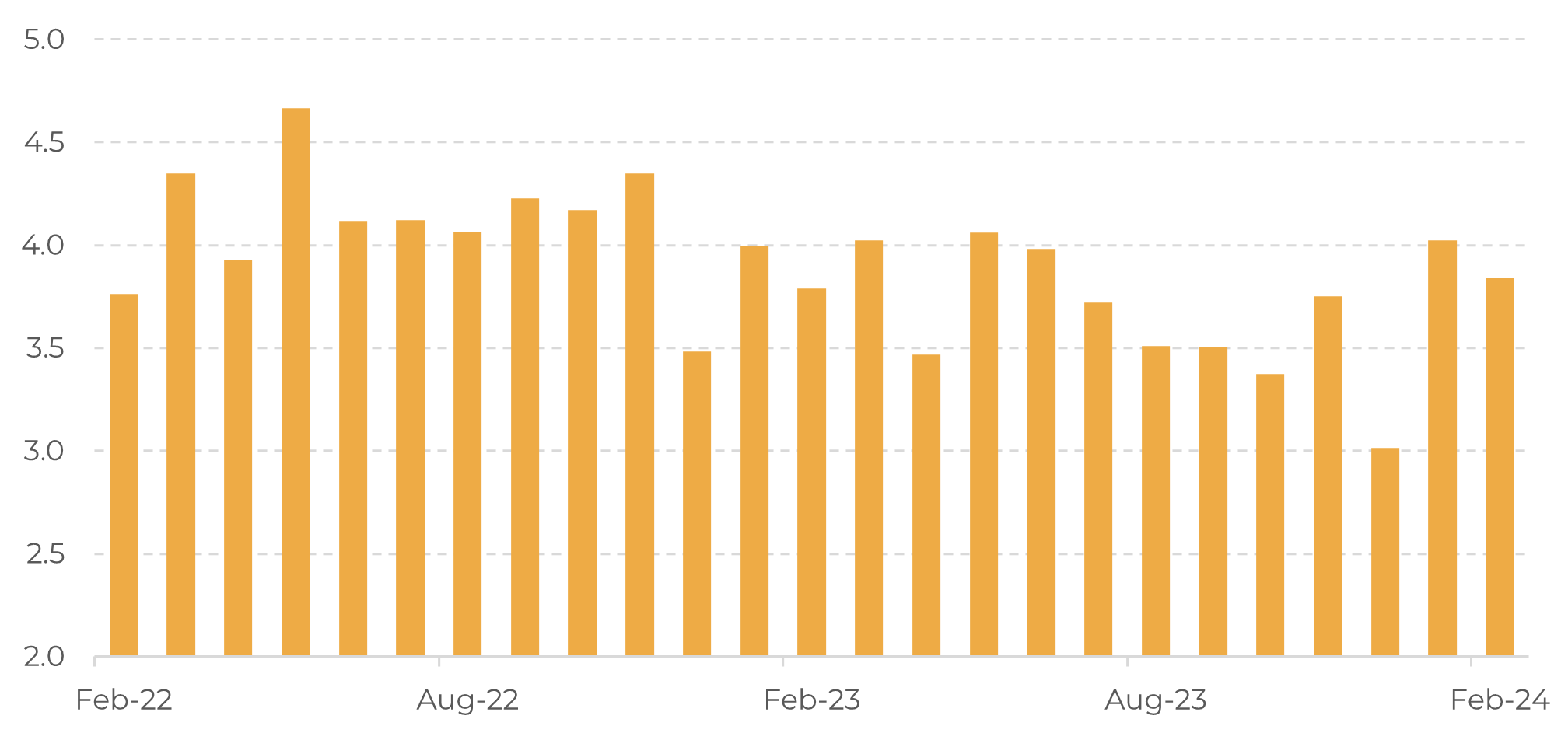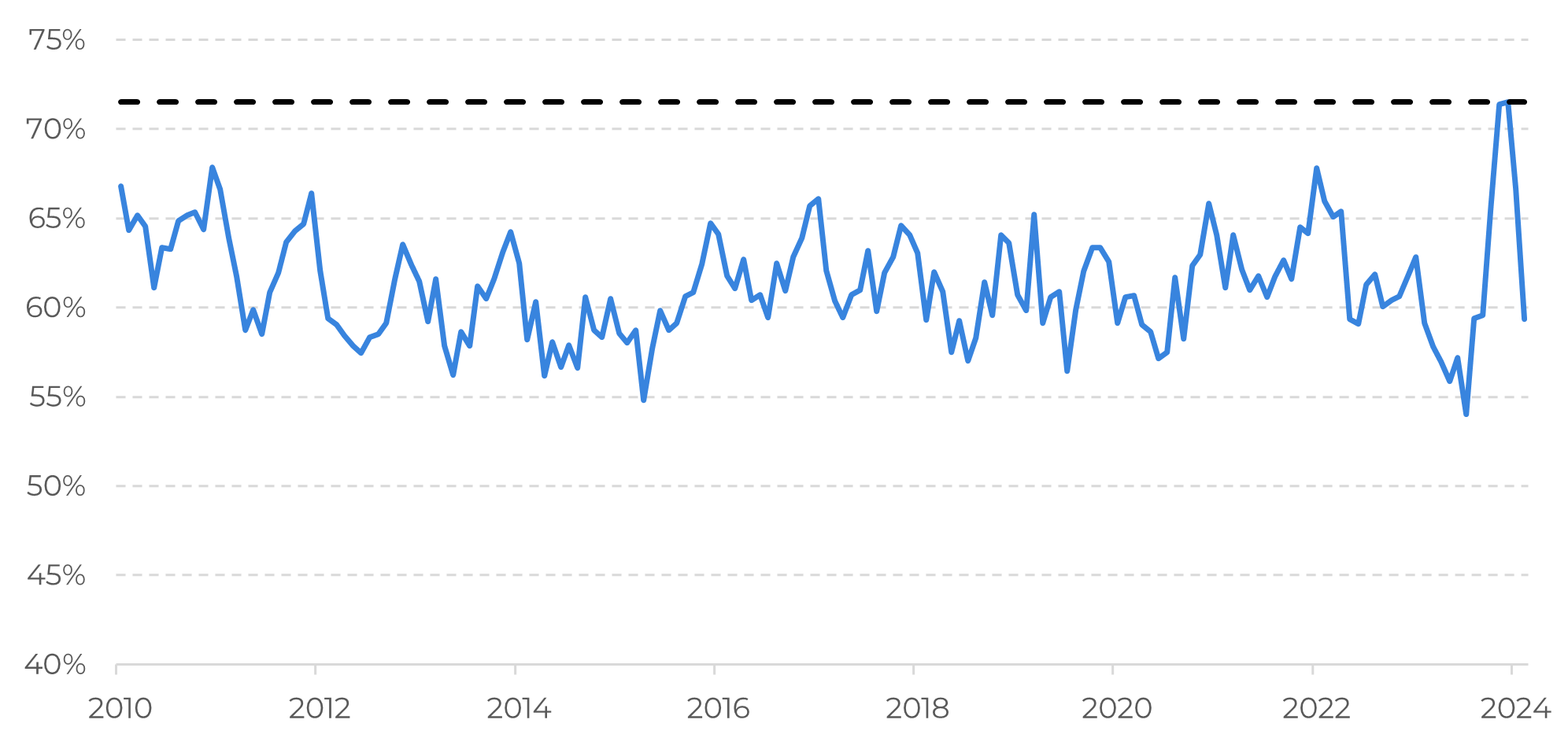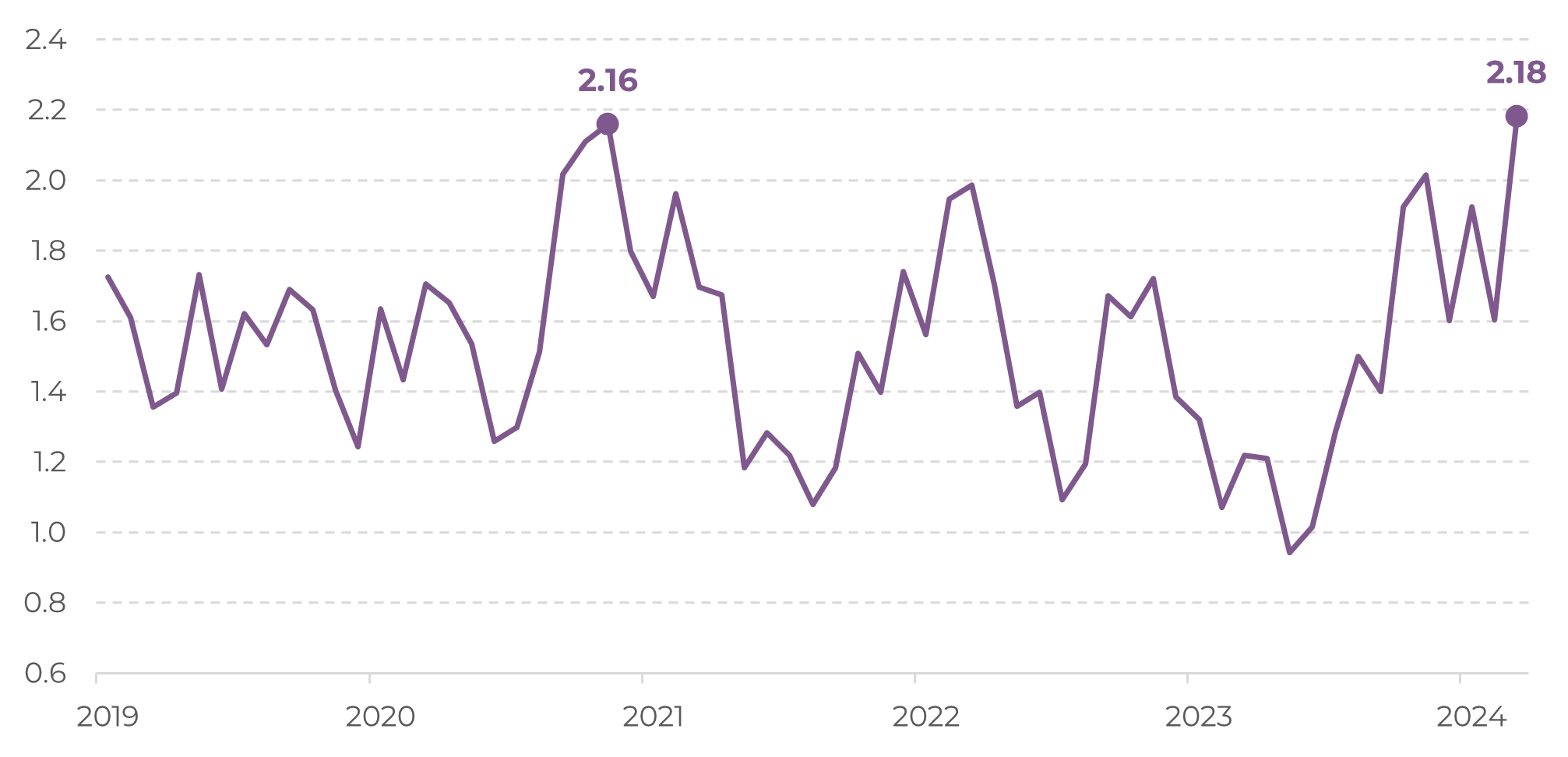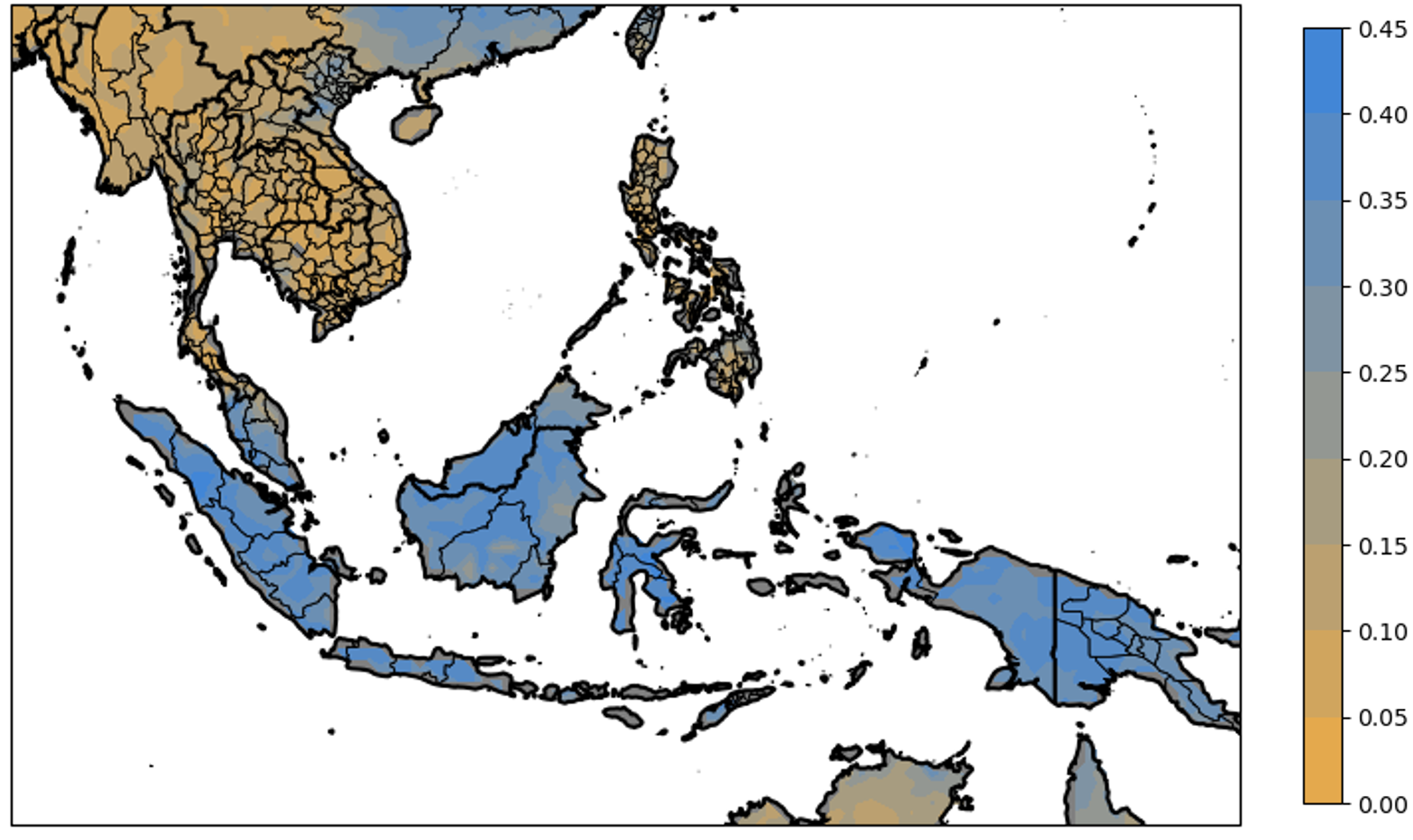
Apr 19
/
Natália Gandolphi
Coffee Weekly Report - 2024 04 19
Back to main blog page
- The European Union's February import data shows some recovery, with 3.84 million bags of green coffee imported, down 5% from January but within historical seasonal patterns.
- The import profile has rebalanced to 60% arabica, reflecting concerns about robusta stock volumes and further tightening in the robusta market.
- Supply challenges in Vietnam and Indonesia may strain robusta availability in the 24/25 cycle. In Vietnam, low soil moisture levels raise concerns, despite the expectation of higher volumes in the next two weeks.
- The EU increased imports from alternative origins, including Brazil, reaching a record high in March. With Brazil's 24/25 harvest approaching, the market anticipates relief from the deficit tightness from July onward.
- However, the current scenario in Vietnam remains uncertain, with accumulated rainfall still below average, but with prospects for recovery.
Adjustment in European Union imports
The European Union has released imports data for February – showing a recovery, albeit limited. The bloc imported 3.84M bags of green coffee, down 5% when compared to January. Still, the move is well within average (-9% between the two months, considering the historical series since 2010), which shows that while the decrease respected seasonality, it was a lot smoother than expected for the period.
It’s also important to note that the profile of imports is balancing itself out after swinging heavily towards arabica in the end of 2023. 60% of the imported volume was arabica, in line with the historical average (61%). The decrease happened after the bloc reported the highest share of arabica imports since 2010 in December (72%).
The change reflects both an equilibrium after the pendulum swung so heavily into the arabica range, but also a clear concern regarding the volume of robusta stocks in the bloc, with buyers getting ready for a more intensive tightening in the robusta market.
This could happen due to two main reasons: first, Vietnam will enter its exports’ offseason in Q2, and while the market would rely more on other origins in Southeast Asia, Indonesia may see another cycle of limited supply, due to adverse weather during development, and possible delays due to the forecast of heavier rainfall levels over the next weeks.
Figure 1: European Union Green Coffee Imports (M bags)

Source: Eurostat
Figure 2: Share of Arabica in European Union Imports

Source: Eurostat, Hedgepoint
In this scenario, it’s already known that the bloc has been importing more coffee from alternative origins, Brazil included. In March, that volume spiked to a record high: 2.18M bags (the previous high in the short-term series was reported in November 2020).
Now, with the upcoming harvest of the 24/25 cycle in Brazil, the market expects volumes to relieve some of the deficit tightness, especially from July onwards. Farmer selling for the 23/24 cycle was stretched thin over the past quarter, with 96% of the conilon crop already sold by April. At 22.54M bags of production, this would represent less than 1M bags in net stocks (stocks that have only been sold, and not necessarily exported or consumed internally; as a rule of thumb, gross stocks are generally 3 to 4 times higher than net stocks, but it’s been known to vary a lot between crops).
In this scenario, the 24/25 harvest already consolidates its leading role, and sellers are likely to act in accordance with the daily changes in climate forecasts observed for the main robusta producer, Vietnam. Soil moisture levels are considerably low, but the forecast has recently changed to suggest that the dry spell may be coming to an end. By watching the situation in Vietnam unfold, the market may observe selling pressure points.
Figure 3: Total Brazilian Exports – European Union (M bags)

Source: Cecafé
Figure 4: Soil Moisture – Vietnam and Indonesia (0-0.1m below ground content)

Source: NOAA, Hedgepoint
In Summary
The European Union's February imports data shows some recovery, with 3.84 million bags of green coffee imported, down 5% from January but within historical seasonal patterns. The import profile has rebalanced to 60% arabica, reflecting concerns about robusta stock volumes and further tightening in the robusta market.
Supply challenges in Vietnam and Indonesia may also strain robusta availability further in the 24/25 cycle. The EU increased imports from alternative origins, including Brazil, reaching a record high in March. With Brazil's 24/25 harvest approaching, the market anticipates relief from the deficit tightness from July onward, but in the meantime, the market will watch closely how the weather pattern develops in Vietnam.
Weekly Report — Coffee
Written by Natália Gandolphi
natalia.gandolphi@hedgepointglobal.com
natalia.gandolphi@hedgepointglobal.com
Reviewed by Laleska Moda
laleska.moda@hedgepointglobal.com
www.hedgepointglobal.com
Disclaimer
This document has been prepared by hEDGEpoint Global Markets LLC and its affiliates ("HPGM") exclusively for informational and instructional purposes, without the purpose of creating obligations or commitments with third parties, and is not intended to promote an offer, or solicitation of an offer, to sell or buy any securities or investment products. HPGM and its associates expressly disclaim any use of the information contained herein that may result in direct or indirect damage of any kind. If you have any questions that are not resolved in the first instance of contact with the client (client.services@hedgepointglobal.com), please contact our internal ombudsman channel (ouvidoria@hedgepointglobal.com) or 0800-878-8408 (for clients in Brazil only).
Contact us
hedgepointhub.support@hedgepointglobal.com
ouvidoria@hedgepointglobal.com
Funchal Street, 418, 18º floor - Vila Olímpia São Paulo, SP, Brasil
Check our general terms and important notices.
This page has been prepared by Hedgepoint Schweiz AG and its affiliates (“Hedgepoint”) solely for informational and instructional purposes, without the purpose of instituting obligations or commitments to third parties, nor is it intended to promote an offer, or solicitation of an offer of sale or purchase relating to any securities, commodities interests or investment products. Hedgepoint and its associates expressly disclaim any use of the information contained herein that directly or indirectly result in damages or damages of any kind. Information is obtained from sources which we believe to be reliable, but we do not warrant or guarantee the timeliness or accuracy of this information. The trading of commodities interests such as futures, options, and swaps involves substantial risk of loss and may not be suitable for all investors. You should carefully consider wither such trading is suitable for you in light of your financial condition. Past performance is not necessarily indicative of future results. Customers should rely on their own independent judgement and/or advisors before entering in any transaction.Hedgepoint does not provide legal, tax or accounting advice and you are responsible for seeking any such advice separately.Hedgepoint Schweiz AG is organized, incorporated, and existing under the laws of Switzerland, is filiated to ARIF, the Association Romande des Intermédiaires Financiers, which is a FINMA-authorized Self-Regulatory Organization. Hedgepoint Commodities LLC is organized, incorporated, and existing under the laws of the USA, and is authorized and regulated by the Commodity Futures Trading Commission (CFTC) and a member of the National Futures Association (NFA) to act as an Introducing Broker and Commodity Trading Advisor. HedgePoint Global Markets Limited is Regulated by the Dubai Financial Services Authority. The content is directed at Professional Clients and not Retail Clients. Hedgepoint Global Markets PTE. Ltd is organized, incorporated, and existing under the laws of Singapore, exempted from obtaining a financial services license as per the Second Schedule of the Securities and Futures (Licensing and Conduct of Business) Act, by the Monetary Authority of Singapore (MAS). Hedgepoint Global Markets DTVM Ltda. is authorized and regulated in Brazil by the Central Bank of Brazil (BCB) and the Brazilian Securities Commission (CVM). Hedgepoint Serviços Ltda. is organized, incorporated, and existing under the laws of Brazil. Hedgepoint Global Markets S.A. is organized, incorporated, and existing under the laws of Uruguay. In case of questions not resolved by the first instance of customer contact (client.services@Hedgepointglobal.com), please contact internal ombudsman channel (ombudsman@hedgepointglobal.com – global or ouvidoria@hedgepointglobal.com – Brazil only) or call 0800-8788408 (Brazil only).Integrity, ethics, and transparency are values that guide our culture. To further strengthen our practices, Hedgepoint has a whistleblower channel for employees and third-parties by e-mail ethicline@hedgepointglobal.com or forms Ethic Line – Hedgepoint Global Markets.Security note: All contacts with customers and partners are conducted exclusively through our domain @hedgepointglobal.com. Do not accept any information, bills, statements or requests from different domains and pay special attention to any variations in letters or spelling, as they may indicate a fraudulent situation.“HedgePoint” and the “HedgePoint” logo are marks for the exclusive use of HedgePoint and/or its affiliates. Use or reproduction is prohibited, unless expressly authorized by HedgePoint. Furthermore, the use of any other marks in this document has been authorized for identification purposes only. It does not, therefore, imply any rights of HedgePoint in these marks or imply endorsement, association or seal by the owners of these marks with HedgePoint or its affiliates.
We have updated our Terms & Conditions to reflect improvements to our platform, data handling practices, and the overall experience we provide to our clients.
To continue using the Hedgepoint HUB, please review and accept the updated terms.

